[social_warfare buttons="Pinterest,Twitter,Facebook"]
After two weeks in Namibia, South Africa felt like a gluten free travel haven! Don’t get me wrong, Namibia is an amazing must-see destination and can be very gluten free friendly (check my Gluten Free Travel Guide to Namibia)! Comparatively, we found more gluten free awareness, better food allergen labeling, and even some delicious gluten free products in South Africa.
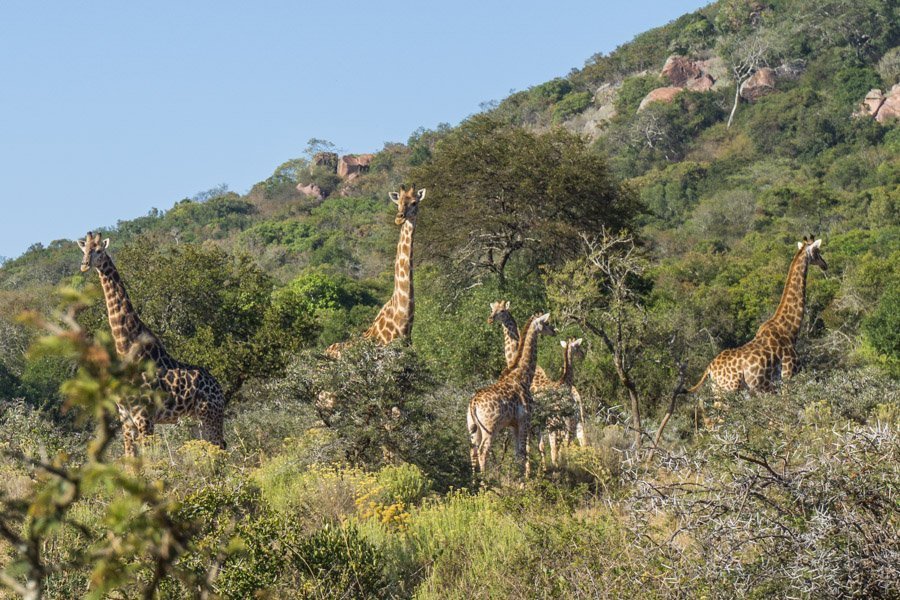
Since I was working and staying in a rural location for part of my visit, my experience in South Africa covers a wide scope of destinations. I also visited Kruger National Park and spent a few days in Johannesburg. In the future, I’ll write more about my experience navigating gluten free food in a homestay and with a full work schedule. In the meantime, this post is packed with information to help you start planning your gluten free South Africa vacation!
Here are some of the adventures South Africa has in store for you:
- Kruger National Park - an African game park with easy views of the Big 5!
- The unforgettable Apartheid Museum in Johannesburg
- Stunning views along the Garden Route via a road trip from Port Elizabeth to Cape Town
- The beautiful city of Cape Town
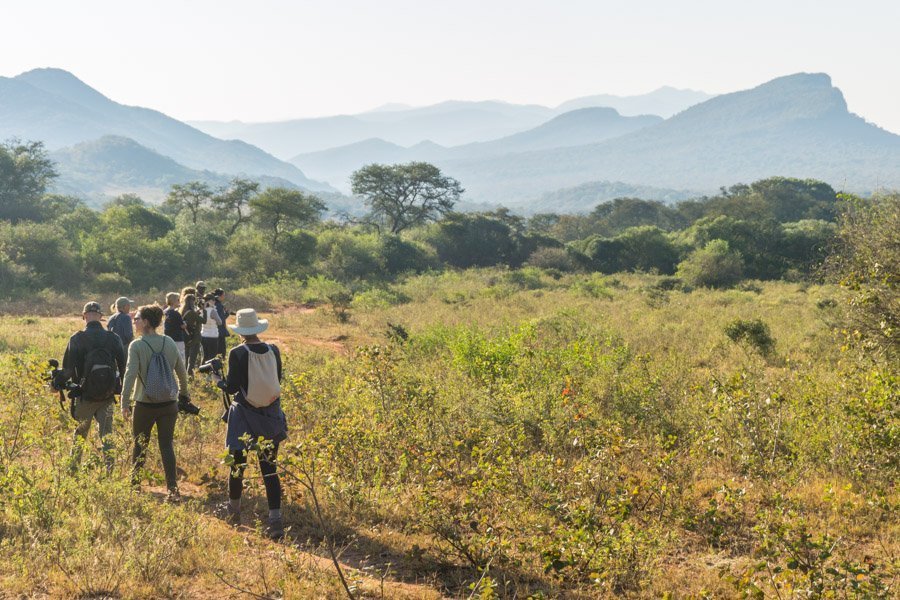
Now that South Africa is on your bucket list, here’s what you need to know for safe and successful gluten free travel in this wild and wonderful destination!
Contents
What you need to know about gluten free travel in South Africa
Gluten free foods you can rely on
Where to get gluten free food
What you should bring from home
What you need to know about gluten free travel in South Africa
Food Labeling Laws:
In South Africa, all ingredients must be labeled in decreasing order of weight on all food products. Common allergen labeling is also required. This makes food shopping in South Africa a breeze! We found many well-labeled items and specific labeling for “gluten” as well.
More information on South African food labeling can be found here: https://foodfacts.org.za/labelling/
Gluten free Restaurants and Catering
In South African cities, popular restaurant chains in tourist areas are often familiar with gluten free guidelines, but make sure to do your research ahead of time.
When traveling through small cities and towns, my companions and I mostly ate at lodges, especially around Kruger National Park. Gluten free awareness is low and buffet style options make gluten free a bit trickier. In one instance, I called ahead and was assured that getting a gluten free meal would not be a problem. When I arrived, the cook staff had no knowledge of gluten free - be aware that this is a possibility and plan ahead by having an emergency meal on hand just in case! Also, make sure to read the section below on language barriers since this is something you will likely encounter.
Tip: Make sure to call/email your lodging ahead of time to inform them of your dietary restrictions. Be specific about your restrictions and offer possible foods they could make for you to increase your chance of being understood. Some suggestions we used: plain meat with rice or plain pap (see below), hard-boiled eggs, and fresh fruit.
“Pap”, a porridge traditionally made of cornmeal and water, is a common staple in Southern Africa and is frequently served at all meals. Be sure to check with the cook staff to make sure there are no additional ingredients such as spices, sauces, or dairy (if this poses a problem for you). You can also frequently find fresh fruit (bananas grow locally and are abundant) and hard-boiled eggs at buffets. Many places were also willing to make hard-boiled eggs upon request in the morning.
Since we did our own self-drive tour and safari at Kruger National Park, I cannot comment on safari guiding companies and their knowledge of food allergies/sensitivities. However, I suspect they may have a better understanding since they cater to tourists and we expect the subject of “gluten free” has come up with many of these companies in the past.
Language Barriers
There are 11 official languages in South Africa: Zulu, Xhosa, Afrikaans, English, Northern Sotho, Tswana, Sesotho, Tsonga, Swati, Venda, Ndebele (listed in order from most to least spoken). Each language has an origin (tribal “homeland”) within South Africa, so the prevalence of each language varies greatly depending on the region.
One of the most incredible things about South Africans is how many languages an individual may know. It’s not uncommon to know 4, 6, 8, or even a bit of all 11 languages! English is widely spoken in the big cities but is less prevalent as a primary language the farther you travel into the bush. In the tourist sector, you will generally find plenty of helpful English speakers.
Most people preparing your food in South Africa come from the Afrikaans or native population and English is not their primary language. This means that you may have difficulty explaining gluten-free guidelines. I brought an Afrikaans and Zulu gluten allergy translation card from selectwisely.com with me for this trip. I found the Zulu card to be useful on a few occasions, especially in Kruger National Park and around Johannesburg. Much of my two-week stay was in the northern Venda homeland, and I did not have a translation card for Venda. Check out my top 5 Tips for Ordering Gluten free Food Across Language Barriers.
Unexpected Gluten
An unfortunate discovery for us was that wheat gluten is added to many meat products. Be particularly careful of Doerewors and Boerewors sausages (any type of sausage, really) – every brand we checked contained wheat! In addition, Biltong can be a sketchy affair for gluten free eaters, be aware of added wheat starch or wheat gluten.
Gluten free foods you can rely on
To find this information, check out the specific lists and photos in my Gluten Free Travel Guide to Namibia. The gluten free food items in both countries are the same since Namibia imports most food from South Africa. However, South Africa also has several gluten free product lines you can rely on - my personal favorite is a company called Fresh Earth Gluten free Bake House. See the next section for more details on food.
Where to get your gluten free food
Woolworth’s chain grocery stores are an excellent stop for gluten free goodies. The Woolworth’s brand products are well-labeled for allergens and they even have their own FreeFrom line with gluten free crackers, bread, biscuits, and more (be careful of oats if you are sensitive)! Woolworth’s are mostly located in well-populated areas, but we found Spar chain grocery stores in more rural locations. Spars tend to have less specific gluten free goodies but rice cakes, fresh produce, meats, nuts and more are well-labeled and abundant.
Tip: There is a Woolworth’s grocery store in the Johannesburg airport outside of the security area. You can stock up on food as soon as you arrive!
What you should bring from home
You can successfully eat a healthy gluten free diet in South Africa without bringing any additional gluten free foods from home. I always choose to travel with a little emergency food just in case, but I only felt the need to dig into my stash for the long plane rides. Stay tuned for future posts on suggested foods to take with you for travel days!
If you have celiac disease and/or are sensitive to cross-contamination, also be sure to bring your Packable Kitchen so you can prepare your meals safely on the go!
South Africa is a great destination for gluten free travelers and their knowledge and care of allergens is on the rise! Whether your destination is a big city, Kruger Park, or a more rural destination, you can feel confident about eating gluten free in South Africa.
With love and gratitude, ❤︎ Jamie

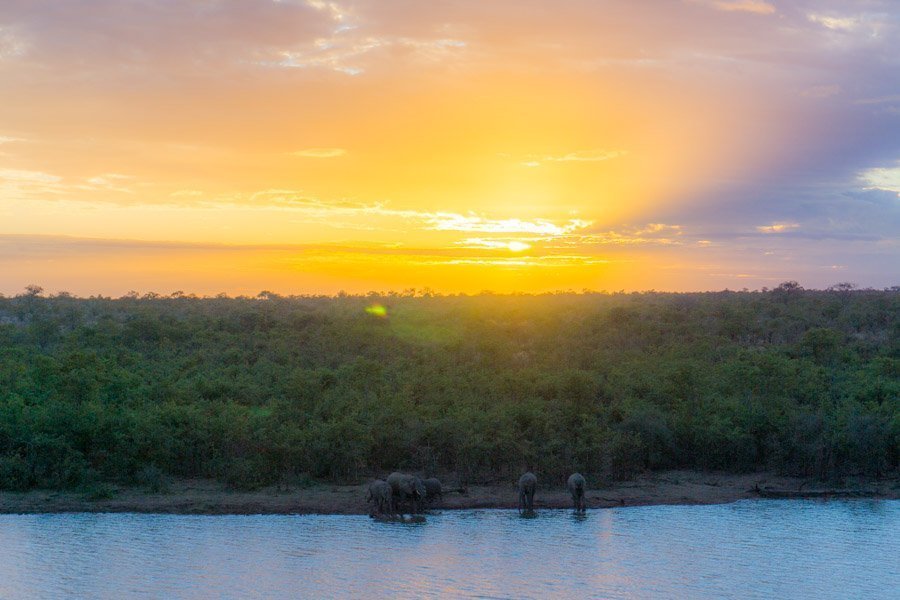
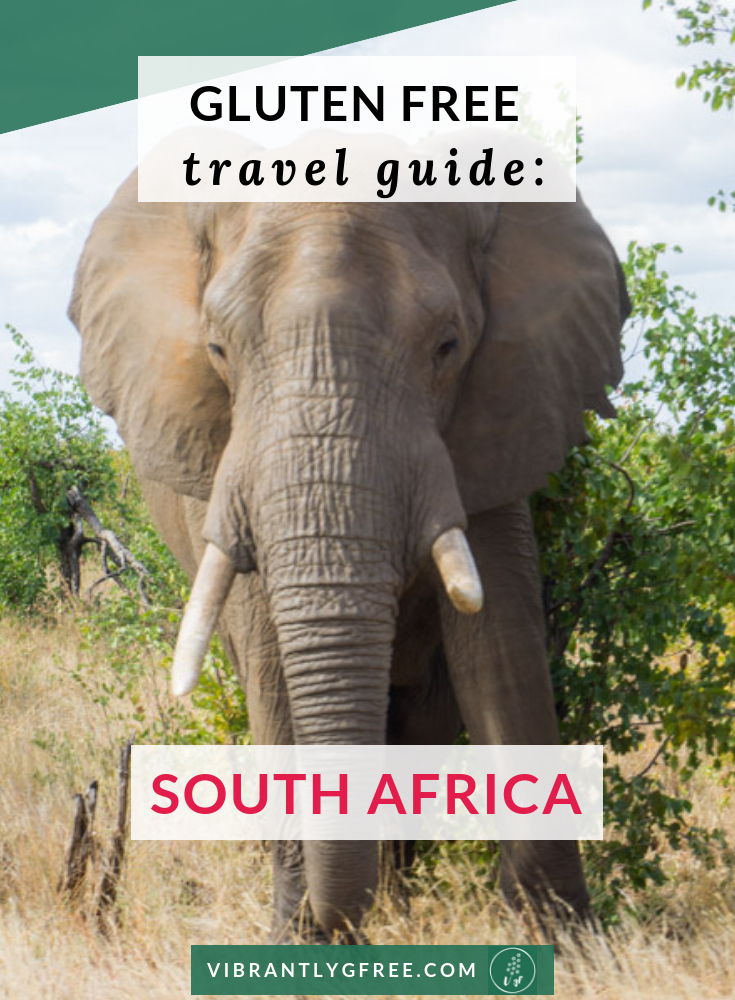
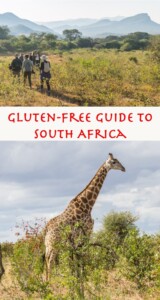
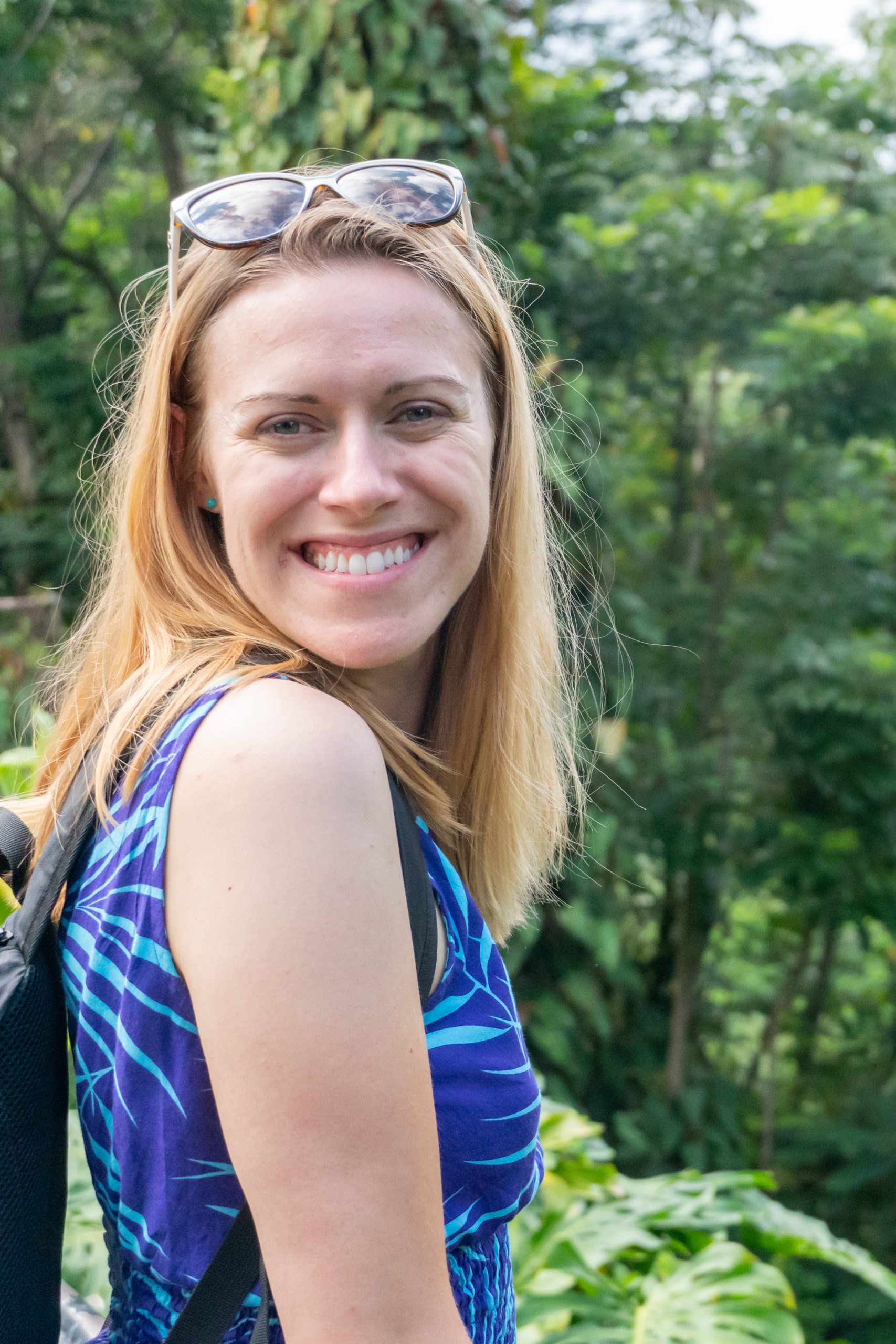
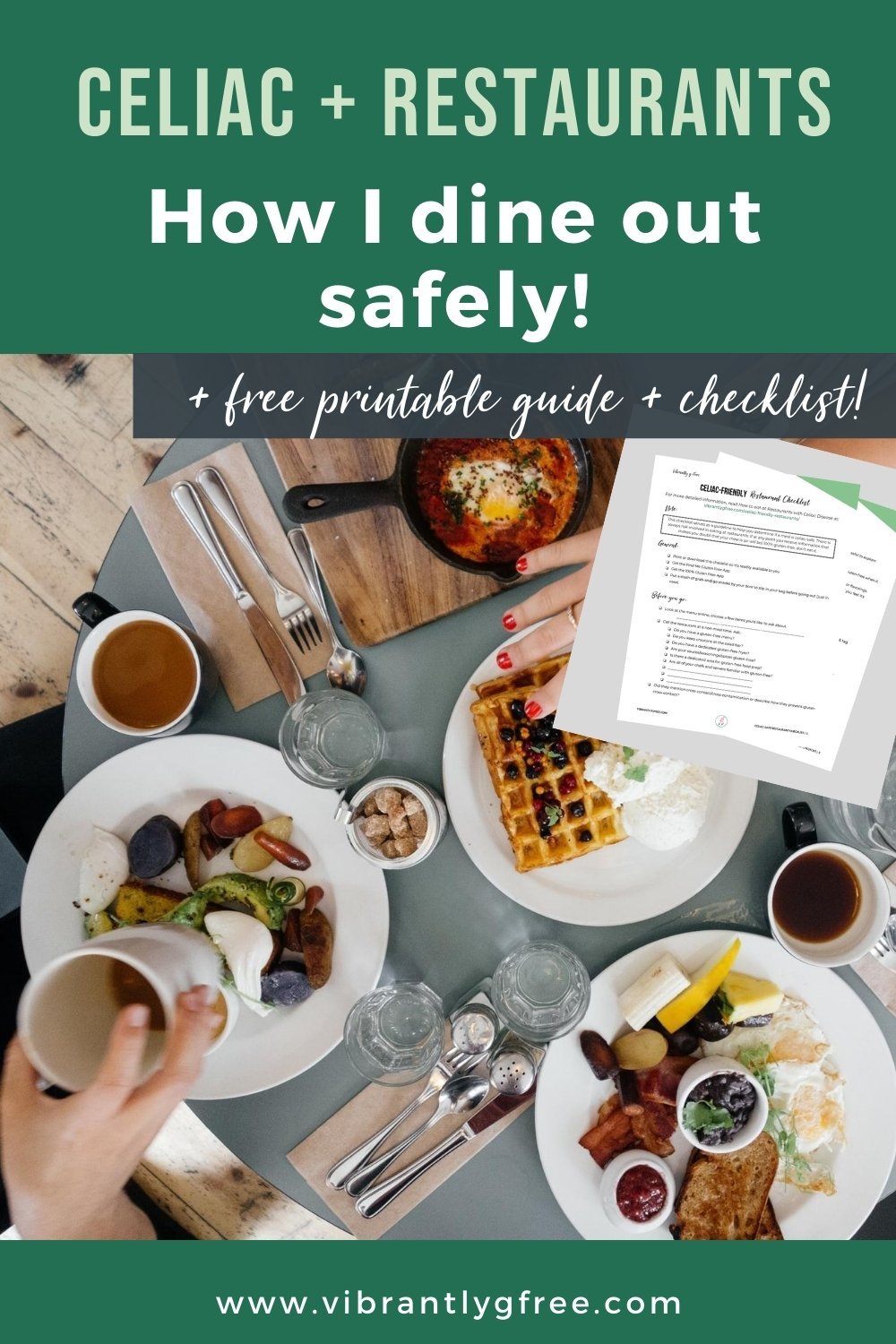

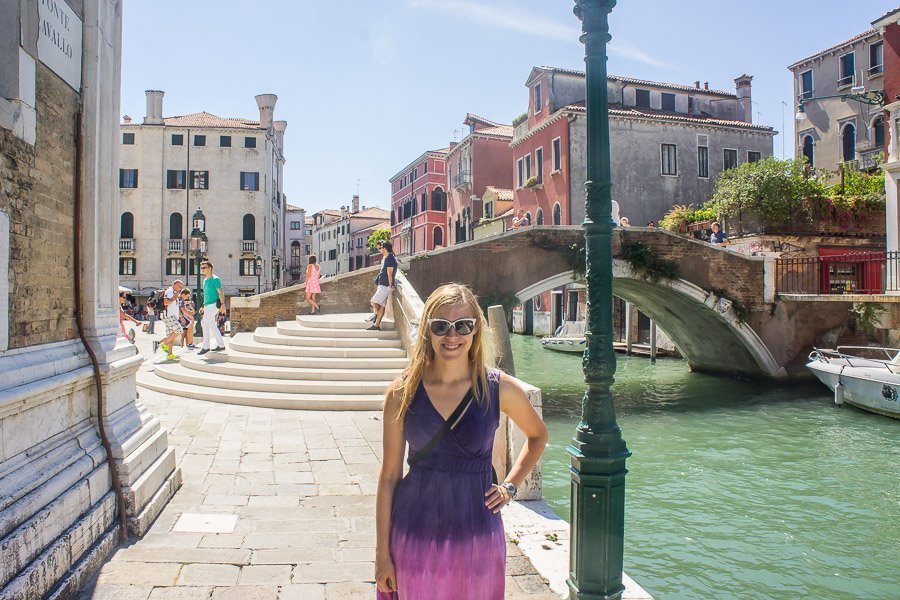
Caitlin says
I’m doing a project about Gluten Free food in South Africa and was wondering if you could share your thoughts on the price of gluten free products and restaurant prices. Also, if you think there is more need for gluten free products and better accessibility.
Celiac Sojourness says
Hey Caitlin! I was mostly teaching in Limpopo when I was in South Africa and only ate at one restaurant. It was a safari lodge by the Kruger and they did an excellent job providing me with plain meat and rice. It was a fine meal but they did not seem to know much about gluten-free. There was one lodge that misinterpreted gluten-free and provided me with sourdough bread (not gluten-free sourdough).
I was overall impressed with the selection of gluten-free foods at Woolworth's. Some stores were better stocked than others, but even in more rural locations, I was able to find something I could eat.
Gluten-free foods were definitely more expensive than their gluten counterparts but the mark-up was not more than it is in the USA where I live. Other than large chain grocery stores, there were no gluten-free foods in any of the markets I visited in Limpopo. I stuck to naturally gluten-free foods like potatoes and cheese in these locations. Feel free to ask more questions for you project! You can also email me at vibrantlygfree@gmail.com or message me on instagram @vibrantlygfree
Kim Shongwe says
Hi Caitlin
I am currently living in South Africa been here for over 10 years. I am also Gluten intolerant. Over the years I have noticed a good number of brands becoming more aware of the gluten free market. Unfortunately I think what pushed retailers in my opinion is the whole trend around being gluten free and using it as a lifestyle rather than the fact that for a lot of people its due to intolerances, allergies and even life threatening diseases. If there was more awareness a lot of grocery stores and especially health stores would take packaging and ingredients more seriously than they do. However a lot of big chain retailers such as Pick n pay, Spar, Woolworths and Dischem (my favorite to get my gluten free goodies a lot of options, the best) are coming up with more products mostly imported such as Schar products. Some such as Pick n pay and chechers are actually creating their own free from ranges. The larger retailers are able to come up with better costs for their private label merch. The costing of the imported products are really pricey for example for a box of kellogs corn flakes 500g would be R39 for my gluten free cereal it would cost from R39 for the cheaper brands for 350g going up all the way to R80, another example a regular loaf of bread could cost R18 for a 700g loaf and for a gf loaf I buy from my health shop it cost me R50 for the same size. However I am use to the prices and just pick and choose my products wisely.
With regards to restaurants a lot of them are not aware of what gluten free is , so you do have to be careful they can also mistake it with banting. There a few restaurants catching on however the price for dedicated gluten free items always has a surplus over and above the actual cost of the regular meal.
There are great conscious cafes e.g fresh earth and green dot cafe that offer for example vegan and gluten free shopping items and meals. So spaces like that are great because you feel comfortable that the staff are aware and all trained with regards to what they are serving.
Overall the gf space is becoming bigger in SA and compared to some of the other southern African countries for Example Eswatini which is where I am from which has a very weak supply of gf shopping and eating out options.
I hope this was helpful.